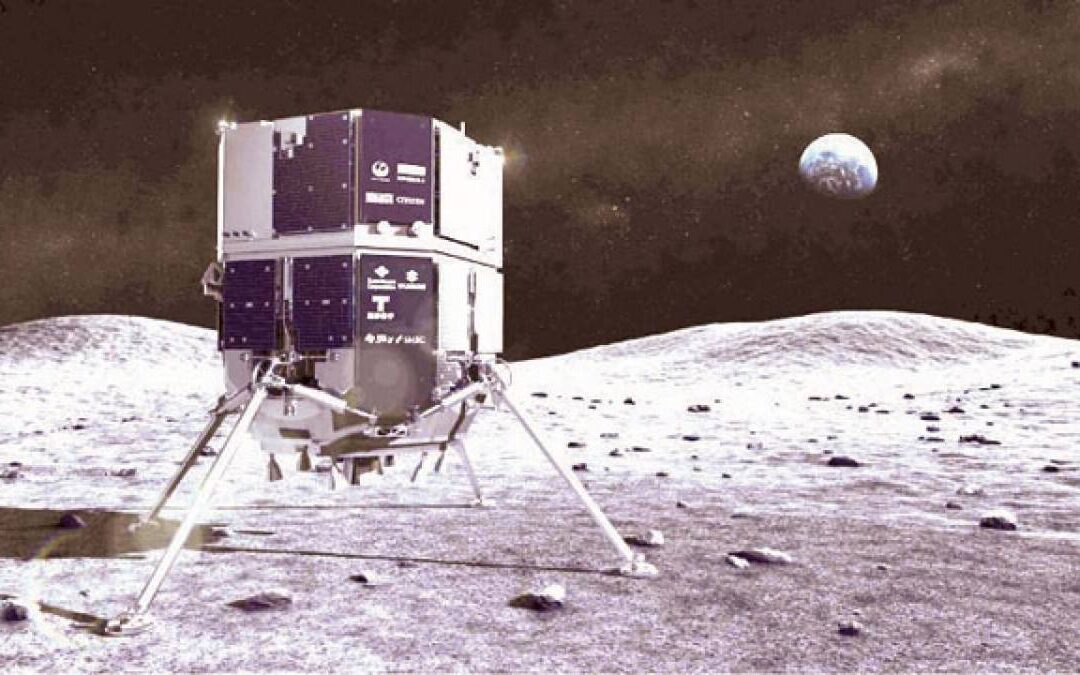Japanese startup launches historic moon mission A Japanese startup called ispace hopes to become the first private company to land a spacecraft on the moon. The company plans to send a small robotic lander and two rovers to the lunar surface in 2020, making Japan the fourth country after Russia, China, and the United States to achieve such a feat.iscape was founded by Takeshi Hakamada in Tokyo in 2010 as a spin-off company from the Japan Aerospace Exploration Agency (JAXA). The startup is working on its first lunar exploration mission, called “EVERYTHING,” which will include two landers and two rovers for a total of four spacecraft that will launch into Earth’s orbit before traveling to the moon.iscape is designing an orbiter capable of carrying as many as 100 rovers to the lunar surface, but at launch will send only two. A second mission called “Lunar Explorers” in late 2020 or 2021 would then send several hundred more rovers to explore the moon’s South Pole region and a large crater that is thought to be the moon’s largest ice deposit.iscape is planning a third mission, “Moon Origin,” for 2025 that will deploy several lunar landers and rovers on the moon — all of which are currently being designed at its headquarters in Tokyo.The company hopes to develop reusable launch vehicles capable of carrying large payloads using in-house technology, and plans to market their services for the commercial transportation of materials in space.
Quick Guide
Exploring the Future of Space Travel: A Look at Japan’s Lunar Mission Plans
The field of space exploration is undergoing some exciting changes in recent years, as private companies have begun encroaching on what was once the sole domain of government-run space agencies. One such company is a Japanese startup called ispace, which has announced plans to land robotic spacecraft on the moon by 2020.
ispace was founded in 2010 by Takeshi Hakamada, who previously worked as a researcher at the Japan Aerospace Exploration Agency (JAXA). The company has been developing small robotic landers and rovers for use in nice not you Sn sc NCT Sameche application. Its first mission, called “EVERYTHING,” will involve two landers and two rovers, which will be launched into Earth’s orbit before traveling to the moon.
ispace is currently working on a second mission called “Lunar Explorers,” which would send hundreds of additional rovers to explore the moon’s South Pole region and a large crater that is thought to be the moon’s largest ice deposit.
In addition to its lunar exploration missions, ispace is also developing reusable launch vehicles capable of carrying large payloads using in-house technology. The company plans to market these services for the commercial transportation of materials in space, as well as for tourism and research purposes.
Also Read: Best Crowdfunding Sites for Startups in 2023
While ispace’s plans are still in the early stages, they represent an exciting new chapter in the history of space exploration. With private companies like SpaceX and Blue Origin making significant strides forward, there may be a bright future ahead for those interested in space travel. Only time will tell how these ambitious plans pan out, but it seems clear that the field of space exploration will continue to evolve as we move further into the 21st century.
It’s clear that ispace has big plans for the future of space travel, and its efforts could help bring about an exciting new era in this area. Whether it’s for research, tourism, or another purpose, the potential for space travel is almost limitless, and it will be fascinating to see what the future holds for this cutting-edge company.
The Quest to Reach the Moon: How Japanese Startup ispace Hopes to Make History
The field of space exploration is characterized by constant change and innovation, with private companies playing an increasingly important role. One such company is the Japanese startup ispace, which has set its sights on going where no man or woman has gone before: the moon.
ispace was founded in 2010 by Takeshi Hakamada, a former researcher at the Japan Aerospace Exploration Agency (JAXA). The company’s mission is to develop and launch robotic spacecraft that will land on the moon, exploring previously undisturbed regions and paving the way for future human missions.
To that end, ispace has announced two separate lunar missions, both of which are slated to take place in 2020. The first mission, called “EVERYTHING,” will involve two landers and two rovers, which will be launched into Earth’s orbit before traveling to the moon. These robotic explorers will collect data on the lunar surface and map out possible landing sites for future missions.
The second mission, called “Lunar Explorers,” would see hundreds of additional rovers sent to the moon’s South Pole region and a large crater that is thought to contain vast amounts of ice. This information would help scientists better understand the composition of the moon and inform future efforts aimed at exploring this intriguing celestial body.
In addition to its work in lunar exploration, ispace is also developing advanced technologies for reusable launch vehicles. Using its own proprietary technology, ispace hopes to market these services for the commercial transportation of materials in space, as well as for tourism and research purposes.
With ambitious plans and a talented team dedicated to realizing them, ispace represents an exciting new chapter in the history of space exploration. Whether they ultimately succeed or fail, their efforts are sure to have a lasting impact on this intriguing field of study. Only time will tell how it all plays out, but one thing is clear: the quest to reach the moon is far from over.
Recommended: Startup Ideas for 2023 Ultimate Guide
The Race to the Moon: Everything You Need to Know About Japan’s Lunar Exploration Program
For decades, the race to the moon has been defined by competition and innovation. Countless nations and private companies have sought to achieve this goal, pushing the boundaries of human knowledge and technological advancement in the process. And while most of these efforts have come from the West, one country is now at the forefront of lunar exploration: Japan.
The Japanese space agency JAXA was founded in 2003 as a result of a merger between two existing organizations. Since then, it has played a leading role in developing advanced technologies for lunar missions, with ispace — a private company founded in 2010 by former JAXA researcher Takeshi Hakamada — serving as its main partner in all things space-related.
In 2018, is Paige announced its first two lunar missions: “EVERYTHING” and “Lunar Explorers.” The former involves the launch of two landers and two rovers into Earth’s orbit, which will then travel to the moon. These robotic explorers will collect data about the lunar surface, as well as map out potential landing sites for future missions.
The second mission, called “Lunar Explorers,” would involve hundreds of additional rovers being sent to the moon’s South Pole. This information would help scientists better understand the composition of the moon and inform future efforts aimed at exploring this intriguing celestial body.
In addition to these exploration programs, ispace is also developing advanced technologies for reusable launch vehicles, or spacecraft that can be used multiple times for a variety of purposes. Utilizing its own proprietary technology, ispace hopes to market these services for the commercial transportation of materials in space, as well as for tourism and research purposes.
With ambitious plans and a talented team dedicated to realizing them, ispace represents an exciting new chapter in the history of space exploration. Whether they ultimately succeed or fail, their efforts are sure to have a lasting impact on this intriguing field of study. Only time will tell how it all plays out, but one thing is clear: the quest to reach the moon is far from over.
Also Read: Famous startups Failures in US Ultimate Guide 2023
Final Talk
The future of space travel is an incredibly exciting and dynamic field, full of opportunity for exploration and innovation. And as the world watches with interest as Japan’s lunar mission plans unfold, one thing is clear: the race to reach the moon is far from over.
With its unique blend of technological prowess and forward-thinking vision, it seems likely that ispace will play a leading role in this ongoing quest to conquer the final frontier. Whether it be through robotic missions or private human expeditions, their efforts are sure to have an impact on our understanding of the universe at large.
So while we wait to see how these ambitious plans ultimately unfold, let us take a moment to appreciate all that has been achieved so far in the world of space travel. After all, the future is now, and we are truly living in a golden age of discovery. Let us embrace the possibilities that lie ahead and continue to push the boundaries of what we can achieve together. Only time will tell where this journey will take us, but one thing is certain: the race to reach the moon has only just begun.


Recent Comments